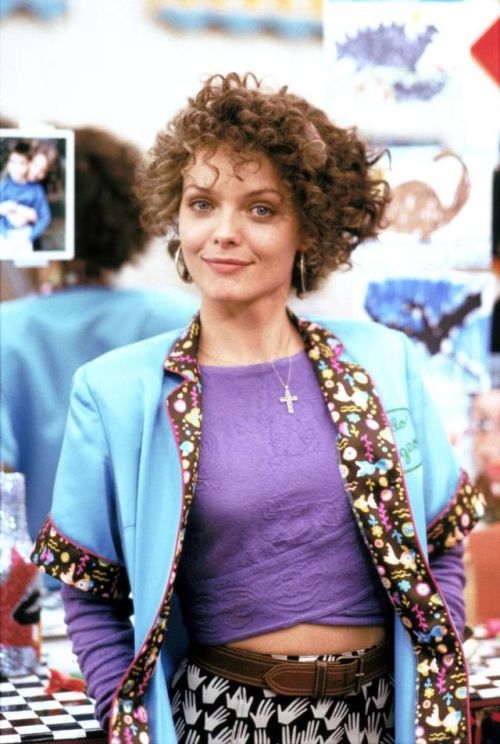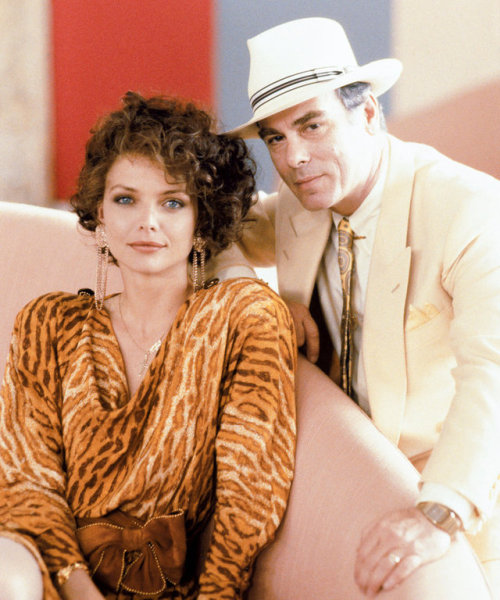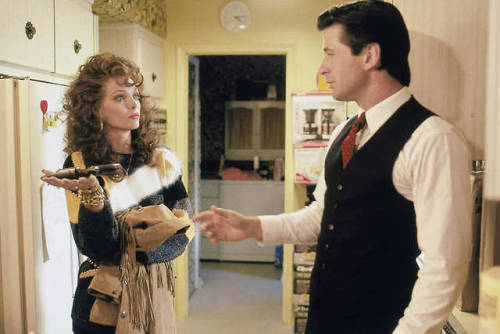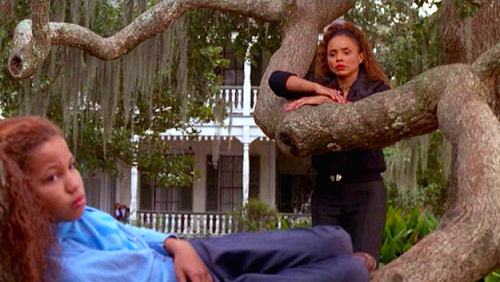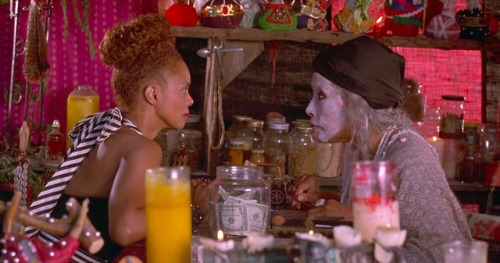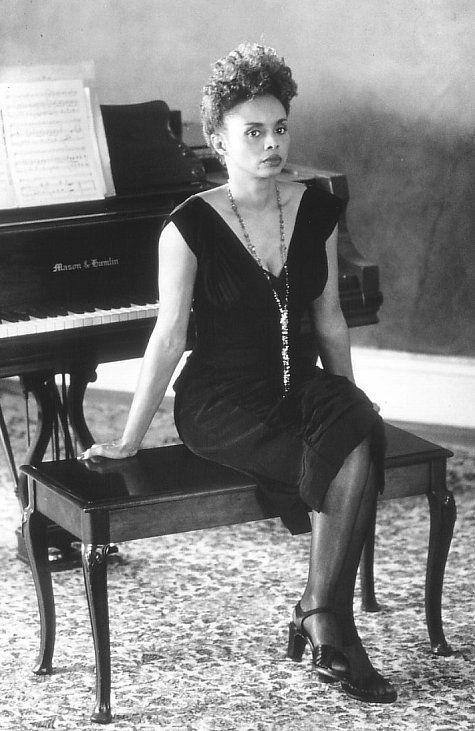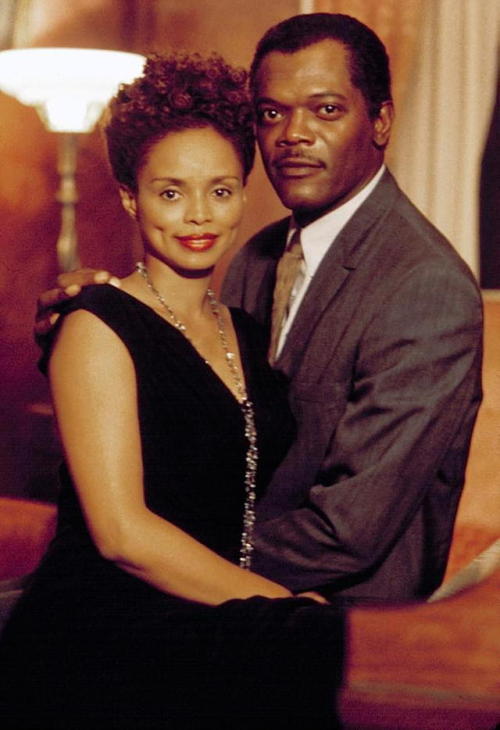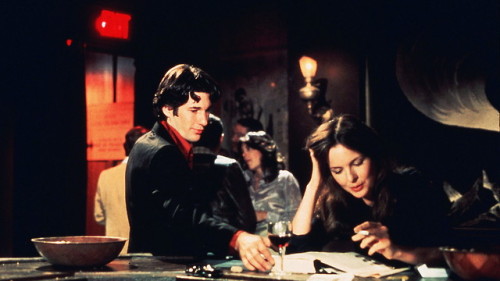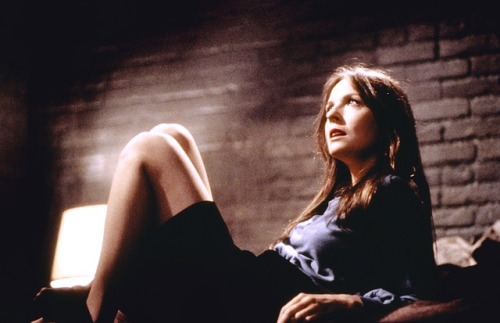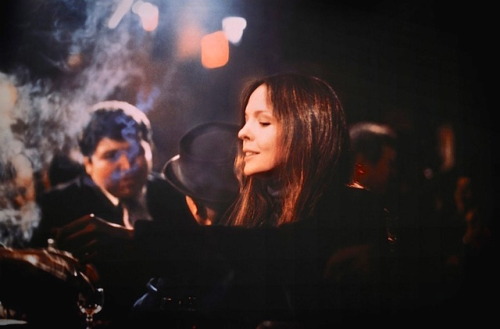#women-centric cinema
Long Island mafia widow Angela de Marco (Michelle Pfeiffer) seeks out a better life in the goofy screwball comedy Married to the Mob (1988, Jonathan Demme; with Dean Stockwell and Alec Baldwin). Some reviews:
“1988 was a defining year in Pfeiffer’s career, thanks in part to her performance as Angela de Marco, the widow of a Mafia enforcer, in Jonathan Demme’s Married to the Mob. The film is hilarious, sometimes even downright farcical in its approach to mob life. That could easily lead an actress to play Angela too broad, especially as she’s so eager to discard her old life. Pfeiffer has great comedic moments here, particularly in the climax when she licks her lips before throwing an intense punch. But despite her big hair, accent, and haphazard walk, it’s the quiet longing in Angela’s eyes that linger most. It’s a hilarious performance anchored by pathos that transforms the film into something genuinely moving.” — Angelica Jade Bastién, “The 10 Essential Roles of Michelle Pfeiffer”,Vulture(June 2017)
“None of it would work without Michelle Pfeiffer, who gets a few choice line-readings as disgruntled mob wife Angela de Marco — her pouty Long Island inflection on the declaration “I want a divorce!” is a particular highlight — but she’s an essential grounding force for the goofballs in her orbit… Demme reserves a lot of genuine feeling for Angela, whose biographical particulars (raised in Queens, one semester at a beauty academy, great follicles) virtually guaranteed that she would end up with a slickster like “Cucumber” Frank de Marco. As much as Demme surrounds her with tacky nouveau-riche décor and colorful eccentrics, Angela’s shot at a second chance in life is seen as courageous and hard-won. She’s pounded the pavement like the rest of the stiffs who circle the classified ads and trudge from one humiliating job interview to the next; it’s a steep drop from the Valium haze of her suburban life to the humble office of a leering Chicken Lickin’ manager… As single-mother empowerment stories go, Married to the Mob stands up to many more austere treatments, owing to Demme and Pfeiffer’s unironic commitment to the character’s plight.” — Scott Tobias, AV Club (July 2009)
Post link
Check out this great essay on Debbi Morgan’s career-best portrayal of frequently widowed 1960s Louisiana psychic Mozelle Batiste Delacroix in the richly evocative Southern Gothic melodrama Eve’s Bayou (1997, Kasi Lemmons; with co-stars Jurnee Smollett, Diahann Carroll and Samuel L. Jackson):
““We’re two of a kind, my brother and I,” Mozelle intones repeatedly, and it takes a formidable talent to play the sister of Samuel L. Jackson (at his most magnetic here, with no 12-letter words in sight). But Morgan actually upstages him. She has a way of gliding into a room as though on a dolly, and her reaction shots are so acute that the film uses them as punctuation. Her unsettlingly wide eyes flicker between emotions outsize and minute, and her sultry, worldly-wise voice sounds just as one imagines Ava Gardner’s did before the studio sanded down the Southern edges. She feels born of the bayous, as endemic to the region as Spanish moss… It’s worth considering Morgan’s turn not only as a great performance but as the kind of supporting work that’s hardly ever recognized—neither ingénue nor overdue, and not, like this year’s front-runners, a masquerading lead. It fuels the eternal hope that admirers of great performances, like Louis in Mozelle’s prophecy, “open their eyes and see that what they’ve been looking for is standing right in front of them.”” — Steven Mears, “On Debbi Morgan in Eve’s Bayou”,Film Comment (February 2016)
And see my previous post on this undervalued classic of black cinema here!
Post link
Diane Keaton in her finest dramatic showcase as tragic swinging schoolteacher Theresa Dunn in the darkly psychosexual character study Looking for Mr. Goodbar (1977, Richard Brooks; featuring Richard Gere). Some notes on her performance:
“Diane Keaton projects the most electrifyingly explicit sexuality ever attained by an American actress in a psychologically plausible movie. In letting go she gives of herself much more freely than Brando did in Last Tango in Paris. She is such a knockout in every way that one regrets that the life of the character she plays has to go down the drain simply to be faithful to the stark outlines of the book. The fact remains that with Annie HallandLooking for Mr. Goodbar coming out the same year, Diane Keaton is clearly the most dynamic woman star in pictures. And any actress who can bring wit and humor to sex in an American movie has to be blessed with the most winning magic. We are not talking now of the warm, cuddly teddy-bear sex in Annie Hall, but the cold, hard, fleshy transactions in loveless lust of Looking for Mr. Goodbar.” — Andrew Sarris, Village Voice (October 1977)
“The film is not judgmental of Theresa’s sexual voraciousness and pursuit of altered states of reality. Quite the contrary, it celebrates her libidinous drive and portrays her as happy and content with her life, except on the occasions when it starts to interfere with her day job. This has a lot to do with Keaton’s startling, orgasmic performance. For the only actor who refused to disrobe in the original Broadway production of Hair, Keaton certainly rises to the occasion here. Showing her breasts unselfconsciously, lifting up her skirt to expose her ass after she straddles her professor lover, she gives a performance of rare sexual frankness and sensuality. When the film really kicks in, following Theresa to a variety of smoky, crowded bars, scoring coke and dancing with the multicultural clientele, you get a genuine sense of the character’s carnal exuberance and exhilaration.” — Bruce LaBruce, “Bruce LaBruce’s Academy of the Underrated: Looking for Mr. Goodbar”,Talkhouse (July 2016)
Post link

